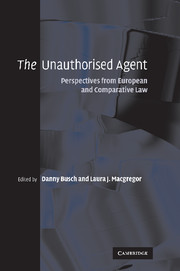Book contents
- Frontmatter
- Contents
- List of contributors
- Foreword
- Preface
- Abbreviations
- Table of cases
- 1 Introduction
- PART 1 The civilian legal systems
- 2 Unauthorised agency in French law
- 3 Unauthorised agency in Belgian law
- 4 Unauthorised agency in German law
- 5 Unauthorised agency in Dutch law
- PART 2 The common law
- PART 3 Mixed legal systems
- PART 4 International ‘codes’
- PART 5 Conclusions
- Bibliography
- Index
3 - Unauthorised agency in Belgian law
Published online by Cambridge University Press: 07 September 2009
- Frontmatter
- Contents
- List of contributors
- Foreword
- Preface
- Abbreviations
- Table of cases
- 1 Introduction
- PART 1 The civilian legal systems
- 2 Unauthorised agency in French law
- 3 Unauthorised agency in Belgian law
- 4 Unauthorised agency in German law
- 5 Unauthorised agency in Dutch law
- PART 2 The common law
- PART 3 Mixed legal systems
- PART 4 International ‘codes’
- PART 5 Conclusions
- Bibliography
- Index
Summary
Introduction
Representation is a legal mechanism that enables a person (the agent) to perform a legal act with a third person (the third party) on behalf of another person (the principal) and by which the legal effects of the act are imputed to the principal. As will be expanded upon below, the mechanism of representation is subject to two conditions: the agent must possess authority to represent, and the agent and the third party must act with the will to represent (contemplatio domini). When the first condition is not met, there is unauthorised agency.
The Belgian Civil Code (‘BCC’) does not contain general rules on representation. Rather, the BCC contains only specific applications of representation, in particular the contract of mandate (a contract whereby one party (the principal) grants authority to represent to another party (the mandatory) and instructs him to conclude a legal act on his behalf). Rules on the conditions and effects of representation are therefore integrated by the legislator in the rules on mandate, namely in Arts. 1997 and 1998 BCC. Moreover, these articles are said to be incomplete and badly edited. The editors of the BCC considered the contract of mandate to be a small and unimportant contract to which only a few articles could be devoted.
In this chapter the general rules applicable in cases of unauthorised agency will be considered first (II).
- Type
- Chapter
- Information
- The Unauthorised AgentPerspectives from European and Comparative Law, pp. 61 - 99Publisher: Cambridge University PressPrint publication year: 2009
- 2
- Cited by



